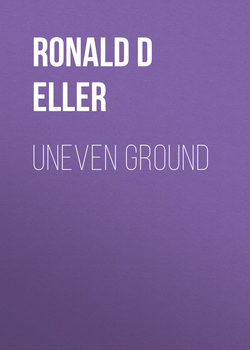Читать книгу Uneven Ground - Ronald D Eller - Страница 8
На сайте Литреса книга снята с продажи.
ACKNOWLEDGMENTS
ОглавлениеWriting history is like piecing together a quilt. Separately the individual records of the past have little meaning until they are arranged by the historian. The remnants of historical evidence, cut from the context of their own time, are empowered to speak to a new generation by the scholar’s pen, but that process of creating meaning from disparate facts is seldom a solitary effort. So it is with this book. The pages that follow are the product of a lifetime of living and learning in the place that I call home, but they are also the result of a growing body of scholarship, expanding archival collections, and the insights of countless students, friends, and teachers who have influenced my thinking over the years. Subsequent writers may rearrange the pieces of the historical record and reach different conclusions, but that is the beauty of books and quilts. They allow each generation to find meaning from the past that speaks again to the present and to the future.
I have spent over forty years teaching and writing about Appalachia. Much of that time I served as director of the University of Kentucky Appalachian Center, a multidisciplinary research center designed to link the resources of the university to the public policy needs of the Appalachian region in areas ranging from education to health care, civic leadership to economic development. In that capacity I worked with journalists, administrators, citizens’ organizations, and public policy makers at the community, state, and national levels, including appointments to head several gubernatorial commissions. At the University of Kentucky, and earlier during a decade of teaching at a small mountain college in North Carolina, I attempted to apply my knowledge as a historian to the challenges and issues facing the region, serving on county planning boards, civic groups, and regional organizations and completing a two-year term as the scholar in residence at the Appalachian Regional Commission. The knowledge I gained from my participation in the public process informs my narrative just as much as do the hours of research in historical documents, archives, and books.
Some of my colleagues would call me a “presentist historian.” I study the past from the perspective of the present to gain insight about those challenges that confront contemporary society. For me, the past is a window to present problems that plague Appalachia and a guide-post for building a more just and sustainable society in a part of the United States that has seen too much inequality, cultural loss, and environmental destruction. My people have lived in the region for more than two hundred years, surviving as farmers, coal miners, mill hands, musicians, preachers, and factory workers. Like other rural Americans, they developed close ties to the land, to family, to their religion, and to their local communities, and they have followed the rest of the nation into the age of consumption. I participated in the great out-migration from Appalachia during the 1950s, the War on Poverty of the 1960s, and the Appalachian renaissance of the 1970s, and I have sat at the table with policy makers as they distributed public funds for the development of the region. In recent years, scholars have gained a much better understanding of the political and economic history of the mountains, but too often we have ignored the lessons of that history, and we, citizens and leaders alike, have continued to abuse each other and the land in our continuing quest for progress. History speaks to us only when we listen.
Like most books, this one is the culmination of years of research and reflects the contributions of dozens of librarians, archivists, statisticians, students, activists, and scholars throughout the region. The staffs at the University of Kentucky Special Collections Library (especially Kate Black), the Berea College Special Collections and Archives, the West Virginia University West Virginia and Regional History Collection, the West Virginia State Archives, the Appalachian Regional Commission in Washington DC, and the Lyndon Baines Johnson Library and Museum in Austin deserve special thanks. Over the years graduate students attending my seminars and serving as research as sistants at the Appalachian Center have provided data analysis and criticism through their own work. Among the many students to whom I am indebted are Glenna Graves, Nyoka Hawkins, Tim Collins, Tom Kiffmeyer, Glenn Taul, Phil Jenks, Carrie Celia Mullins, Jim White, Debbie Auer, Tom Riley, John Burch, Jerry Napier, Carlye Thacker, Lori Copeland, Margaret Brown, Roy Salmons, and Jodi Mullins. Several colleagues and friends read early drafts of this manuscript, including Dwight Billings, Rudy Abramson, Ron Formisano, Robert Weise, and Chad Berry. I deeply appreciate their insight and kindness, even though I did not always take their advice. I am, moreover, indebted to the University of Kentucky College of Arts and Sciences for a sabbatical leave, to the Appalachian Regional Commission for a term as its John Whisman scholar, and to the National Endowment for the Humanities for a summer research stipend. Finally, I want to thank my stepdaughter, Sarah Jane Herbener, for many hours of editing a much too long manuscript. Her critical eye and way with words have added immeasurable clarity to my academic prose.
One person is, however, more responsible for this book than any other, my wife Jane Wilson Eller. Without her steady support, encouragement, and gentle prodding, this manuscript might not have been completed. She alone understands my love for the mountains. After all, this is her story too.
